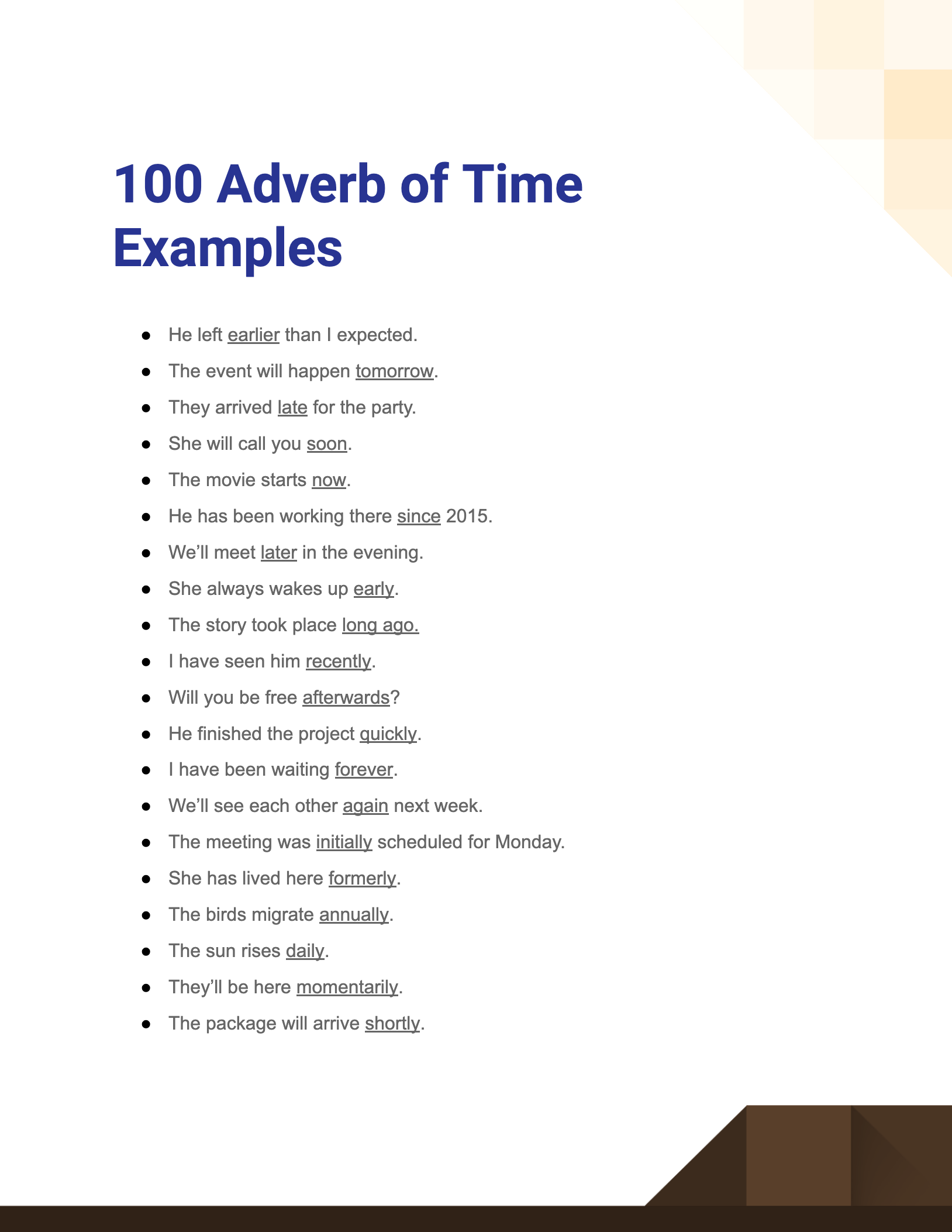99+ Adverb of Time Examples
Navigate the intricate maze of language with our comprehensive guide on adverbs of time. Delve deep into enlightening adverb examples, understand the nuances of their usage, and arm yourself with essential tips to craft impeccable sentences. Whether you’re a budding writer or an avid language enthusiast, our treasure trove on ‘Adverb of Time’ promises to enhance your linguistic prowess. Let time be on your side in every conversation!
What is an Adverb of Time? – Definition
An adverb of time is a word that tells us when an action took place. It provides context to a sentence by indicating the time or duration of an event or action, helping listeners or readers grasp “when” something happened.
What is an example of an Adverb of Time?
Example: She visited her grandmother yesterday.
In this sentence, the word “yesterday” is an adverb of time. It gives us specific information about when the action (visiting her grandmother) took place. Without the adverb, we would know what she did, but not when she did it. With “yesterday” included, we understand that the visit occurred one day prior to the current day.
100 Adverb of Time Examples in Sentences

Dive into the riveting realm of time with our handpicked adverbs! Understand context, sequence, and timing in English sentences. From historical pasts to imminent futures, these 100 distinct adverb of time examples will illuminate your linguistic journey, making every narrative or conversation precise and vivid. Master the ‘when’ of actions and events with our exemplary guide.
- He left earlier than I expected.
- The event will happen tomorrow.
- They arrived late for the party.
- She will call you soon.
- The movie starts now.
- He has been working there since 2015.
- We’ll meet later in the evening.
- She always wakes up early.
- The story took place long ago.
- I have seen him recently.
- Will you be free afterwards?
- He finished the project quickly.
- I have been waiting forever.
- We’ll see each other again next week.
- The meeting was initially scheduled for Monday.
- She has lived here formerly.
- The birds migrate annually.
- The sun rises daily.
- They’ll be here momentarily.
- The package will arrive shortly.
- I saw her yesterday.
- We’ll decide then.
- It happened suddenly.
- We can go nowadays without technology.
- I’m leaving immediately.
- The show is currently on break.
- I’ve known her ever since childhood.
- The sale starts today.
- I have not seen him lately.
- The legend says it happened once upon a time.
- The train departed on time.
- The winter comes yearly.
- He ran continuously for an hour.
- She appeared abruptly.
- The shop closes temporarily at noon.
- We danced all night.
- The flowers bloom seasonally.
- The event was finally over.
- He occasionally visits.
- The mail arrives regularly.
- Let’s discuss this now.
- He will return someday.
- They’ve known each other forever.
- The assignment is due next week.
- The test is already done.
- I’ll be there in a minute.
- The plane will land soon.
- The bell rings daily at noon.
- She called just now.
- We’ve lived here always.
- I’ve been ready for a while.
- The game starts tonight.
- The letter came last month.
- The story happened long before we were born.
- He left suddenly without a word.
- The event will happen weekly.
- The festival takes place every year.
- The chores are done daily.
- They left the day after the party.
- He called first thing in the morning.
- I haven’t heard from him in ages.
- They’ll arrive in a few days.
- The story begins in the distant past.
- We’ll leave at once.
- They’ve been friends since childhood.
- She visited last summer.
- The concert is this weekend.
- We’ll go shopping afterwards.
- The task needs completion by tomorrow.
- She writes to him monthly.
- The festival occurs biannually.
- I’ll finish the task by then.
- The show airs weekly.
- He moved out recently.
- We met the other day.
- The fireworks happen annually.
- I’ll call you right away.
- They visited Paris last year.
- I’ve been waiting for hours.
- The movie is starting presently.
- He had left just before I arrived.
- They will leave in an hour.
- The train comes everyday.
- I saw her the moment I walked in.
- The letter arrived earlier today.
- He’s been working here for years.
- We’ll meet next time.
- The competition is next month.
- The sale ends tomorrow.
- I’ll see you soon.
- He lived there previously.
- We went skiing last winter.
- I’ll finish the work by tonight.
- The conference is in a week.
- They visited the following day.
- We’ll meet in a moment.
- The news broke yesterday evening.
- He left a moment ago.
- I’ll be ready in no time.
- We celebrated her birthday last week.
Adverb of Time Examples in Sentences
Embark on a linguistic journey through time with our curated adverbs. These descriptors/ adverb in sentences enrich our language by pinpointing the ‘when’ in our narratives. Get a clearer picture of events and actions as they unfold in time through these handpicked examples.
- The fireworks lit up the sky at dusk.
- We usually go for a walk at sunrise.
- She plans to study abroad next semester.
- The mail usually comes in the afternoon.
- I’ll get to it first thing tomorrow morning.
- We’re planning a get-together this Friday.
- The bakery opens at dawn.
- They usually chat late into the night.
- The test will be held the coming Wednesday.
- We vacationed in Spain the previous summer.
Adverb of Time Exercise Examples
Sharpen your linguistic skills with these adverb of time exercises. Designed to challenge and enhance your understanding, these exercises will help you cement your knowledge of when and how to use these timely descriptors in your sentences.
Examples:
- The event was scheduled _______ (provide an adverb of time).
- She visited her aunt _______.
- I will finish the assignment _______.
- They went for a drive _______.
- The movie starts _______.
- We have a meeting _______.
- The train departs _______.
- The kids play in the park _______.
- The bakery sells fresh bread _______.
- He goes for a run _______.
Adverb of Time Examples with Answers
Unravel the intricacies of adverbs of time with our illustrative examples and their corresponding answers. Perfect for learners at any stage, this set offers immediate feedback, allowing for quick understanding and mastery of the concept.
- The birds fly south during winter. (Answer: during winter)
- He reads the newspaper every morning. (Answer: every morning)
- We will go on a hike this weekend. (Answer: this weekend)
- She practices piano daily. (Answer: daily)
- The library is closed on Sundays. (Answer: on Sundays)
- They will announce the results next month. (Answer: next month)
- He last visited Paris three years ago. (Answer: three years ago)
- I like to relax in the evening. (Answer: in the evening)
- The project is due in two weeks. (Answer: in two weeks)
- They met on Christmas Day. (Answer: on Christmas Day)
How to Use the Adverb of Time?
Adverbs of time provide valuable information about when an action takes place, offering context and clarity to sentences. Using them effectively can greatly enhance both written and spoken language. Here’s a comprehensive guide on how to use these adverbs:
- Position in a Sentence:
- Beginning: When placed at the start, the adverb of time can emphasize the time element. E.g., “Yesterday, I completed my assignment.”
- Middle: Some adverbs fit naturally between the subject and the main verb or after the auxiliary verb. E.g., “She always takes her tea in the morning.”
- End: Many adverbs of time are positioned at the end of a sentence for a natural flow. E.g., “We went to the movies last night.”
- Duration:
- Adverbs indicating duration provide a timeframe for the action. E.g., “He stayed in the city for a week.”
- Frequency:
- This specifies how often an action occurs. E.g., “I visit my grandmother once a month.”
- Specific Time:
- When pinpointing an exact moment or day. E.g., “The meeting is on Friday.”
- Sequence:
- These adverbs explain the order of events. E.g., “Afterwards, we went for dinner.”
- Be Context-specific:
- Ensure the adverb matches the context. Saying “I’ll call you tomorrow” at a morning meeting is clear, but it can be ambiguous if said late at night.
- Avoid Redundancy:
- Be cautious not to overemphasize time. Avoid sentences like “I’ll see you at 5 pm in the evening.” “At 5 pm” is sufficient.
Tips for Using Adverb of Time
For enhanced clarity and impact in your language, consider the following tips while using adverbs of time:
- Keep it Relevant:
- Only use an adverb of time if it’s essential to the sentence’s meaning. Unnecessary additions can clutter your sentence.
- Stay Consistent:
- When writing a longer piece, maintain consistency. If you start by saying “in 1990”, it’s jarring to later mention “in the nineties.”
- Practice with Different Positions:
- While adverbs of time often sit at the end of sentences, practicing with various positions can enrich your language.
- Avoid Double Adverbs:
- Refrain from using two adverbs that serve the same purpose. “I’ll meet you there tomorrow morning at 9 am” can be too much. Choose the most relevant time indicator.
- Be Specific for Clarity:
- If an action’s timing is crucial, be precise. Instead of “I’ll call you later“, say “I’ll call you this afternoon.”
- Use Variety:
- Don’t rely too heavily on a few familiar adverbs. Expand your vocabulary to keep your language fresh and engaging.
- Understand Cultural Nuances:
- Some adverbs of time might have different connotations in different cultures. For instance, “evening” might be considered 5 pm in one culture and 7 pm in another.
- Refine with Feedback:
- Regularly seek feedback on your usage. Whether it’s from language learning apps, peers, or teachers, external perspectives can highlight areas for improvement.
- Read Widely:
- Exposure to diverse texts – books, newspapers, journals – can offer varied examples of how adverbs of time are used effectively.
- Practice Makes Perfect:
- Like any language element, the more you use adverbs of time in your writing and speaking, the more comfortable and skilled you’ll become.



